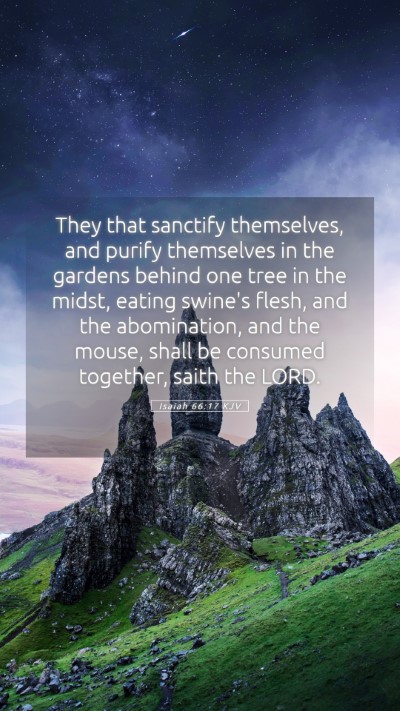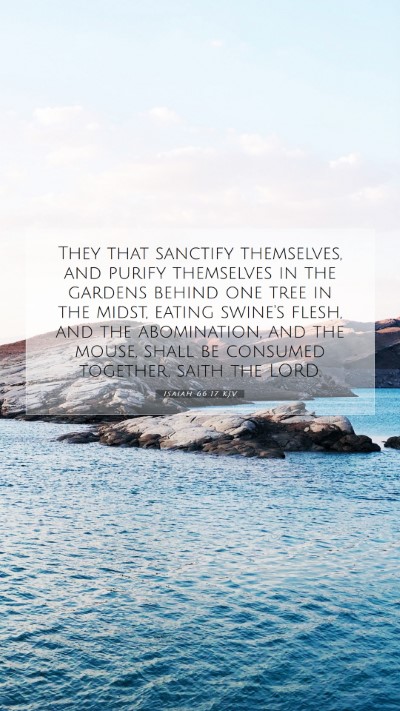Understanding Isaiah 66:17
Bible Verse: Isaiah 66:17
Verse (KJV): "They that sanctify themselves, and purify themselves in the gardens behind one tree in the midst, eating swine's flesh, and the abomination, and the mouse, shall be consumed together, saith the LORD."
Overview
Isaiah 66:17 addresses the consequences of false worship and disobedience to God's laws. It highlights the futility of trying to separate oneself from sin while engaging in practices that are abhorrent to the Lord.
Commentary Insights
-
Matthew Henry:
Henry emphasizes the gravity of the sin described in this verse. He points out that the Israelites were participating in rituals that contradicted God's commandments, particularly through their consumption of unclean animals. This act symbolizes a significant departure from purity and holiness demanded by God.
-
Albert Barnes:
Barnes elaborates that the sanctification referred to in this verse was hypocritical. The people believed that by separating themselves in secluded places for worship, they could avoid the true weight of their sins. He asserts that this verse communicates God's disapproval of such practices and the inevitable divine judgment that follows.
-
Adam Clarke:
Clarke notes the distinction between physical and spiritual cleanliness. He points out that external purification rituals meant nothing when the heart was engaged in sinful practices. Clarke conveys that the actions described are those of idolatrous worship and reflect a rebuke against superficial piety.
Key Themes
- Hypocrisy in Worship: The verse illustrates the concept that rituals do not substitute for genuine obedience to God's commands.
- Consequences of Disobedience: The mention of divine judgment serves as a warning against unfaithful practices in worship.
- True Purity vs. Ritual Purity: Emphasizes that true purity comes from the heart and not merely from rituals or traditions.
Biblical Context
This verse appears in the context of Isaiah's prophecy about the future of Israel, where the distinction between the righteous and the wicked is made clear. It reflects God's ultimate judgment and the restoration of His people. It's crucial to understand the historical and cultural background of the Israelites during this period to fully grasp the severity of the message Isaiah conveys.
Application of the Verse
For contemporary readers, Isaiah 66:17 serves as a powerful reminder to evaluate our own worship practices and the sincerity of our hearts. It calls for a deeper understanding of what it means to live a life aligned with God's will, free from hypocrisy. Engaging in online Bible study or joining bible study groups can provide valuable insights into applying scripture to daily living.
Cross References
- Leviticus 11 - Discusses dietary laws regarding clean and unclean animals.
- Matthew 15:11 - Jesus teaches about what truly defiles a person.
- 1 Peter 1:16 - Calls believers to be holy as God is holy.
Conclusion
Isaiah 66:17 is more than a historical warning; it invites readers to reflect on their own lives and practices. In understanding this verse, we enhance our bible verse understanding and deepen our bible study insights. By examining the interpretations of respected commentators, we can grasp the significant spiritual truths that transcend time.


